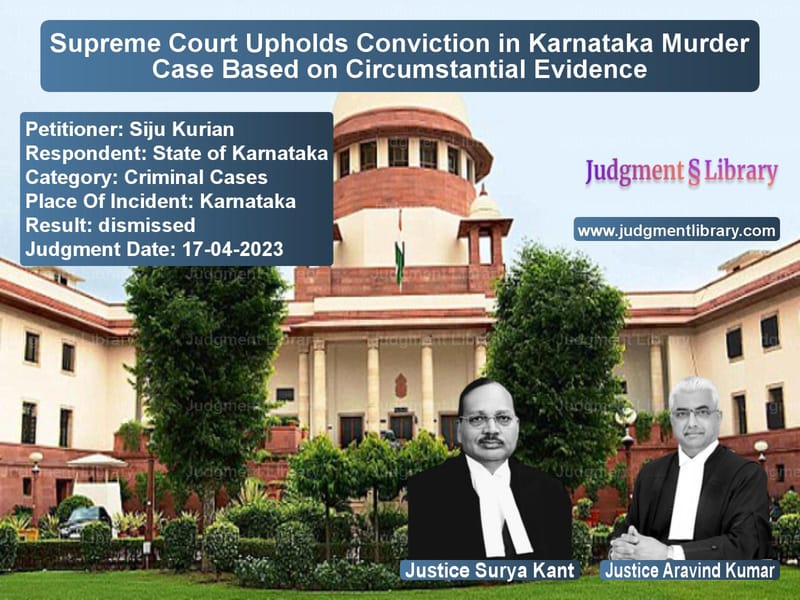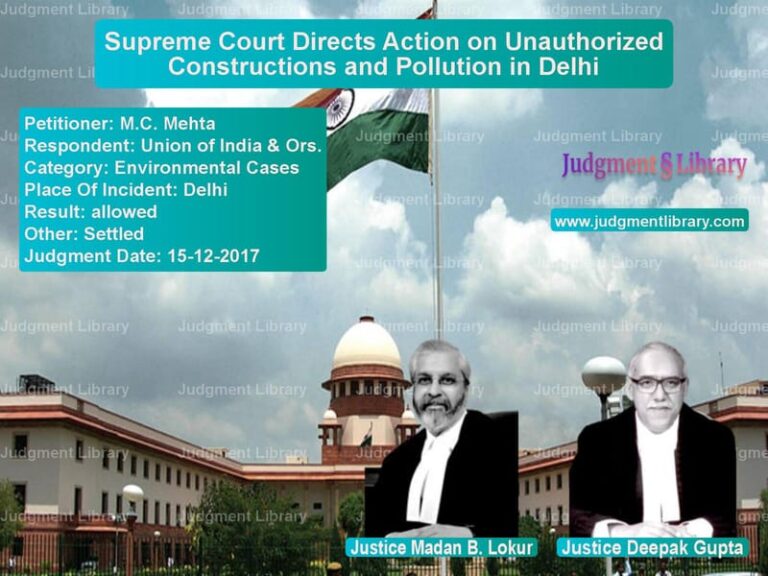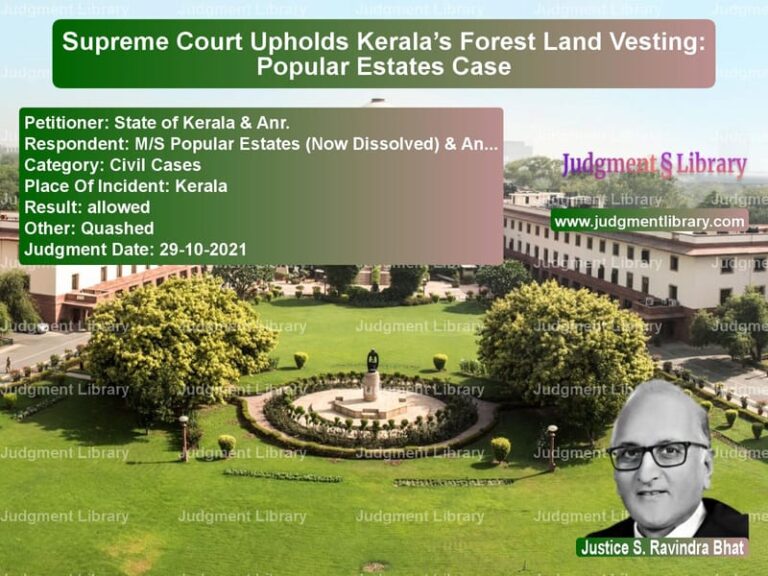Supreme Court Upholds Conviction in Karnataka Murder Case Based on Circumstantial Evidence
The case of Siju Kurian vs. State of Karnataka is a significant judgment where the Supreme Court upheld the conviction of the accused based on circumstantial evidence. The case highlights the legal principles governing circumstantial evidence, last seen theory, and the admissibility of confessional statements leading to the discovery of material evidence. This judgment serves as an important precedent in criminal law, emphasizing the role of indirect evidence in proving guilt beyond a reasonable doubt.
Background of the Case
The appellant, Siju Kurian, was employed as a laborer at the farm of the deceased, Jose Kafan, in Kerodi village, Karnataka. The prosecution alleged that on December 2, 2011, the accused murdered his employer while he was sleeping, using an iron rod to strike fatal blows on the victim’s face and head. To conceal the crime, the accused buried the body in a pit meant for storing ash manure. Furthermore, the prosecution claimed that after the murder, the accused stole various belongings of the deceased and attempted to sell the victim’s property by impersonating his son.
Trial Court Proceedings
The trial court initially acquitted the accused, finding that the prosecution had failed to establish an unbroken chain of circumstantial evidence. The trial judge ruled that the prosecution did not provide direct evidence linking the accused to the crime, and the confessional statement recorded in Kannada was unreliable since the accused did not understand the language. The prosecution then appealed to the Karnataka High Court.
High Court’s Judgment
The Karnataka High Court overturned the trial court’s acquittal, convicting the accused under Sections 302 (murder), 201 (causing disappearance of evidence), 404 (dishonest misappropriation of property), and 419 (cheating by impersonation) of the Indian Penal Code. The High Court reasoned that the trial court had ignored crucial circumstantial evidence, including:
- The accused was last seen with the deceased.
- The accused attempted to sell the victim’s land and personal belongings.
- The confessional statement led to the recovery of the body.
- Material witnesses corroborated the sequence of events.
The High Court, therefore, sentenced the accused to life imprisonment along with additional terms for other offenses.
Arguments by the Petitioner (Appellant)
The appellant challenged the High Court’s verdict before the Supreme Court, raising the following arguments:
- “The conviction is solely based on circumstantial evidence, which is not conclusive.”
- “There are gaps in the chain of events that do not rule out other possibilities.”
- “The accused’s confessional statement was recorded in Kannada, which he does not understand, making it unreliable.”
- “The last seen theory is weak and cannot conclusively prove guilt.”
- “The trial court’s judgment was reasonable and should not have been overturned.”
Arguments by the Respondent (State of Karnataka)
The prosecution, representing the State of Karnataka, countered the defense’s claims, asserting:
- “The accused was last seen with the deceased, and he has not provided any explanation regarding the victim’s death.”
- “The accused’s confession led to the recovery of the dead body, which is admissible under Section 27 of the Evidence Act.”
- “The accused attempted to sell the victim’s land by impersonating his son, indicating a motive for the murder.”
- “Multiple prosecution witnesses, including neighbors and forensic experts, corroborated the prosecution’s version of events.”
Supreme Court’s Analysis and Judgment
After examining the arguments and evidence, the Supreme Court upheld the High Court’s ruling, making the following key observations:
- “The circumstantial evidence in this case is consistent, coherent, and leads to the inescapable conclusion of the accused’s guilt.”
- “The accused’s confessional statement, though challenged, led to the discovery of the body, making it partially admissible.”
- “The last seen theory, when combined with other circumstantial evidence, strengthens the prosecution’s case.”
- “The High Court rightly reversed the trial court’s acquittal, as the latter had failed to consider material evidence.”
Consequently, the Supreme Court dismissed the appeal, affirming the conviction and life sentence imposed by the Karnataka High Court.
Key Takeaways from the Judgment
- Circumstantial evidence can be sufficient for conviction if it forms a complete chain of events excluding any other hypothesis.
- Confessional statements leading to discovery of material evidence are admissible under Section 27 of the Evidence Act.
- Last seen theory, when corroborated with additional evidence, strengthens the prosecution’s case.
- Appellate courts have the power to reverse acquittals if the trial court’s findings are perverse or ignore material evidence.
Impact of the Judgment
This ruling reinforces the legal position that circumstantial evidence, if strong and corroborated, can serve as the basis for conviction. It also emphasizes the responsibility of appellate courts in reviewing lower court judgments that overlook critical evidence. The case serves as a precedent for similar criminal trials where direct evidence is unavailable but circumstantial evidence provides a compelling case.
Read also: https://judgmentlibrary.com/supreme-court-grants-bail-to-uapa-accused-after-four-years-in-custody/
By upholding the Karnataka High Court’s decision, the Supreme Court has reaffirmed the importance of a holistic approach in evaluating evidence, ensuring that justice is served based on a thorough assessment of all relevant factors.
Petitioner Name: Siju Kurian.Respondent Name: State of Karnataka.Judgment By: Justice Surya Kant, Justice Aravind Kumar.Place Of Incident: Karnataka.Judgment Date: 17-04-2023.
Don’t miss out on the full details! Download the complete judgment in PDF format below and gain valuable insights instantly!
Download Judgment: siju-kurian-vs-state-of-karnataka-supreme-court-of-india-judgment-dated-17-04-2023.pdf
Directly Download Judgment: Directly download this Judgment
See all petitions in Murder Cases
See all petitions in Bail and Anticipatory Bail
See all petitions in Attempt to Murder Cases
See all petitions in Fraud and Forgery
See all petitions in Custodial Deaths and Police Misconduct
See all petitions in Judgment by Surya Kant
See all petitions in Judgment by Aravind Kumar
See all petitions in dismissed
See all petitions in supreme court of India judgments April 2023
See all petitions in 2023 judgments
See all posts in Criminal Cases Category
See all allowed petitions in Criminal Cases Category
See all Dismissed petitions in Criminal Cases Category
See all partially allowed petitions in Criminal Cases Category







